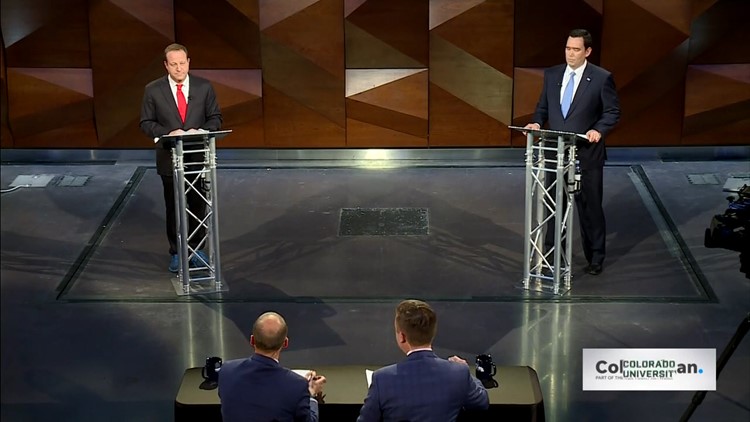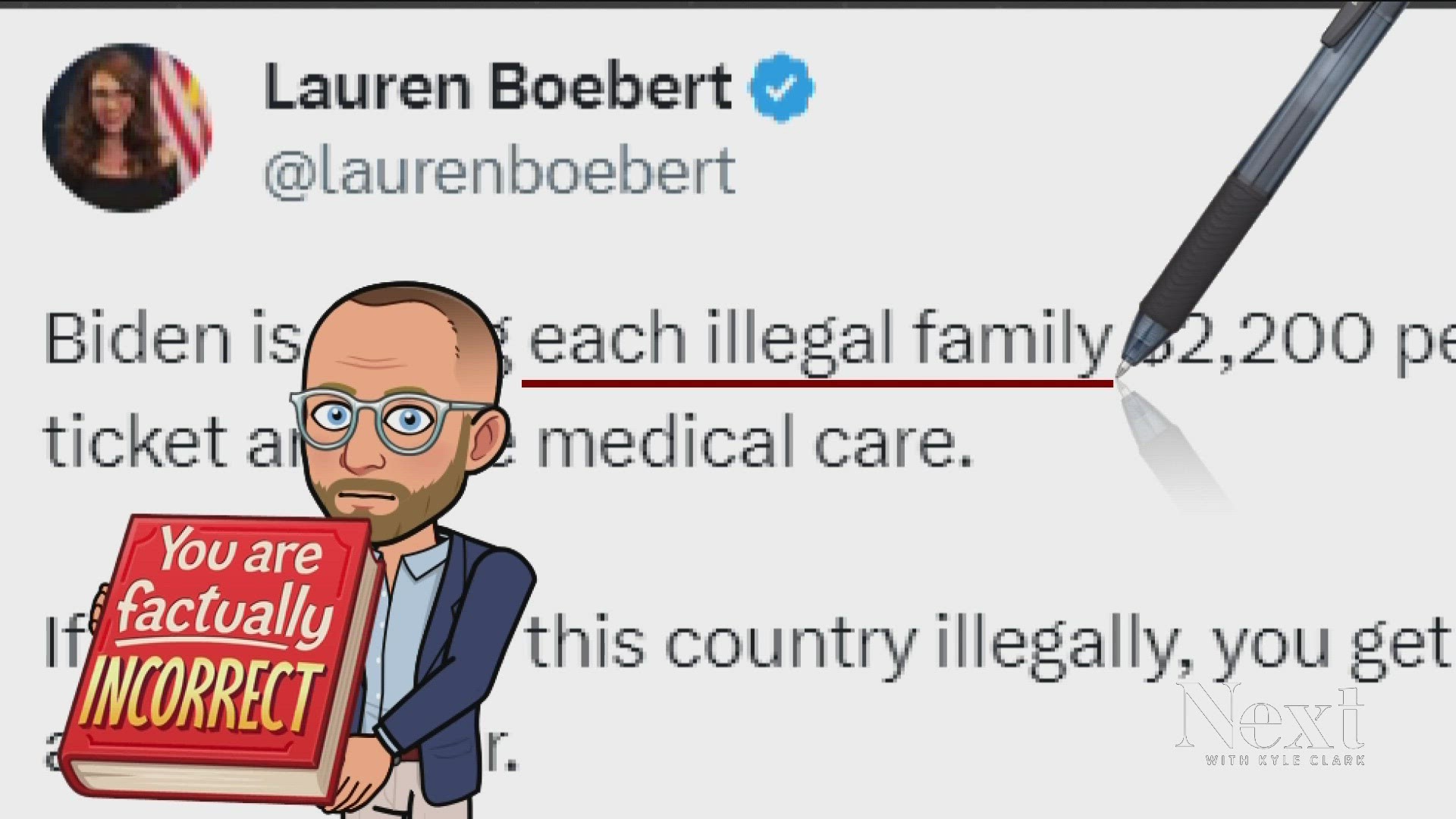KUSA — The two major party nominees in Colorado’s gubernatorial race squared off in Fort Collins Wednesday during a debate three weeks before the Nov. 6 election.
The debate, co-sponsored by 9NEWS and the Fort Collins Coloradoan, was moderated by 9NEWS Anchor Kyle Clark and Political Reporter Marshall Zelinger. The Coloradoan’s Nick Coltrain asked pre-submitted education questions for Democratic Congressman Jared Polis and Republican State Treasurer Walker Stapleton.
9Wants to Know fact-checked the debate while it was happening. You can see which statements were true and which were false below.
CLAIM: Jared Polis said he supported a mill levy that passed
VERDICT: True
District 51 voters approved Measures 3A and 3B on Nov. 7, 2017.
Measure 3A is a mill levy override that raises property taxes within D51 boundaries by $6.5 million annually for 10 years specifically for the following purposes.
CLAIM: Stapleton said Polis is against transportation measures Proposition 109 and Proposition 110.
VERDICT: True and false
Polis said he opposes Proposition 109, which uses existing money to pay for bonds to fix the state’s roads. These bonds need dedicated revenue to protect schools, health care and other state priorities, Polis said. He was neutral on Proposition 110, however. That would create a dedicated sales tax to pay for infrastructure bonds.
CLAIM: Walker Stapleton said sheriffs have been sued over sanctuary cities
VERDICT: True
Lawsuits filed by the ACLU this year against El Paso County Sheriff Bill Elder and Teller County Sheriff Jason Mikesell are being watched by sheriffs and immigration advocates across the state.
Some believe the cases will end up before the 10th Circuit Court of Appeals after two state judges made contradictory early rulings. While two other circuits have ruled that sheriffs cannot hold people suspected of being in the country illegally beyond their scheduled release, the 10th Circuit, which has jurisdiction over Colorado, has not been asked to weigh in on the legality.
CLAIM: Polis says he has always been in favor of local control.
VERDICT: Misleading.
Polis withdrew support of two initiatives in 2014, one of which would have given voters a chance to vote on local control.
Polis withdrew support for two ballot initiatives he'd fiercely championed just days before. One would have increased the distance oil and gas wells must be from homes and schools, substantially enlarging "no-frack zones" statewide; the other would have established an "environmental bill of rights," allowing local governments to restrict, or even ban, fracking.
CLAIM: Stapleton said "sanctuary cities are defined as a narrow issue as somebody who has entered the country illegally and has committed a felony. And in committing a felony, I don’t think somebody should be treated with more rights and protections than a US citizen."
VERDICT: Needs context
So-called “sanctuary cities” refer to those cities that have an immigrant in the country illegally who was arrested or incarcerated for a crime. This is not limited to felonies, and it is not limited to people who have been convicted of a crime.
The White House defines a “sanctuary city” as one where officials “ignore requests from federal immigration officials to hold criminal suspects that the city has arrested for state or local criminal offenses even where the alien is charged with or convicted of a very serious felony.”
CLAIM: Stapleton said that he opposed a “red flag” bill that would have allowed courts to temporarily remove guns from a person deemed an “extreme risk” because he said the accused was not given the ability to have legal representation in a court hearing.
VERDICT: Needs context.
Though the “red flag” bill ultimately did not pass, it did require a hearing and a petition from the concerned party, be it a family or house member or law enforcement officer to obtain a court order.
There was nothing in the legislation that explicitly barred a defendant from having representation nor did it say that they are guaranteed it.
The bill would have required a family or household member or law enforcement officer to petition a court for an “extreme risk protection order.” It also would have required the court to hold a hearing in person on or by telephone, and would have required on-going hearings.
To read the proposed legislation, click here: https://bit.ly/2J4sp4b
CLAIM: Polis claims it would cost $200 million to implement full-day kindergarten.
VERDICT: False
It currently costs the state of Colorado $108 million to send approximately 26,000 kids to preschool and half-day kindergarten.
There are currently 200,000 kids of preschool and kindergarten age in the state. That’s almost eight times more students than are currently enrolled, meaning it’s likely that it would cost far more than $200 million to send them all to preschool and kindergarten.
CLAIM: Polis alleges the Roe v. Wade threat is not hypothetical.
VERDICT: True, needs context.
Justice Brett Kavanaugh has stated Roe v Wade is “precedent” but never stated outright he would oppose overturning Roe vs. Wade.
Several commentators suggest how he worded his response shrouded how he would vote if Roe v. Wade were challenged, and it kept open the possibility that precedents can be overturned.
Kavanaugh’s confirmation swung the Supreme Court to likely 5-4 on overturning Roe vs. Wade.
CLAIM: Stapleton said there’s a 50 percent price disparity between medical and retail marijuana.
VERDICT: False
The state 15 percent sales tax for retail marijuana is five times higher than the state sales tax rate of 2.9 percent for medical marijuana. Retail marijuana is taxed 417 percent higher than medical marijuana at the state level.
Local governments can add their own tax to medical and recreational marijuana.
Marijuana Taxes (a breakdown from the Colorado Department of Revenue)
Total marijuana revenue includes:
2.9 percent state sales tax on medical marijuana and retail marijuana
Retail marijuana is exempt from the state sales tax starting July 1, 2017
The first report reflecting this exemption is August 2017
State retail marijuana sales tax
10 perent rate from January 1, 2014 - June 30, 2017; 15% rate starting July 1, 2017
The first report reflecting the 15% rate is August 2017
15 percent state retail marijuana excise tax
Starting July 1, 2017, the state retail marijuana sales tax rate is 15 percent, the state share is 90 percent of the total tax collected, and the local government share is 10 percent of the total tax collected. (Note: The first report reflecting the 15 percent rate is August 2017.)
WATCH: The candidates for governor of Colorado are making news for what they did tell you in the debates, and what they decided not to tell you. They didn't think we'd just go away if they didn't answer, did they?



